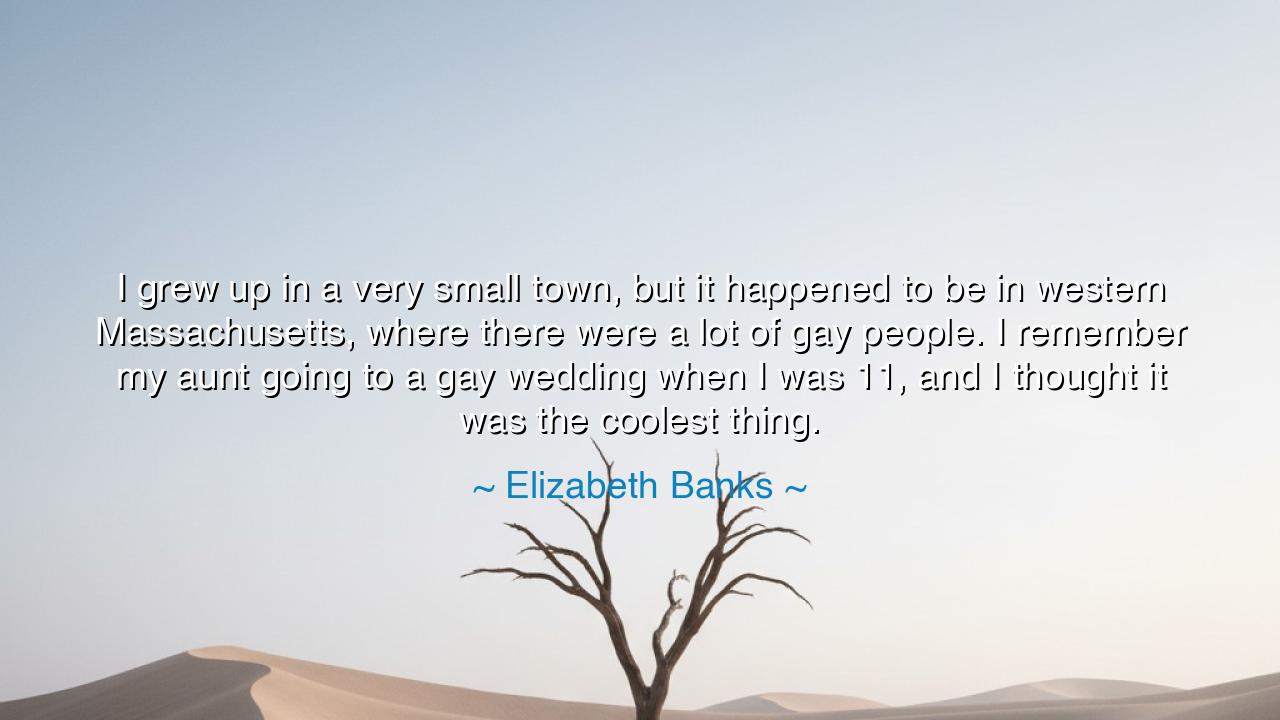
I grew up in a very small town, but it happened to be in western
I grew up in a very small town, but it happened to be in western Massachusetts, where there were a lot of gay people. I remember my aunt going to a gay wedding when I was 11, and I thought it was the coolest thing.






In this saying of Elizabeth Banks, we find the seed of truth that even in a small town, greatness of spirit may arise. She speaks of a childhood set in the quiet hills of western Massachusetts, where the ordinary world was woven with threads of extraordinary acceptance. From her words, we learn that the measure of a place is not in its size, but in the courage of its people to embrace love in all its forms. A child’s memory of seeing her aunt attend a gay wedding is not a trivial tale, but a symbol of how the flame of equality burns even in corners thought too remote for its light.
This memory is sacred, for it shows how the eyes of the young behold what the elders choose to honor. When she saw her aunt walk joyfully into a wedding of two souls uniting in love, she saw more than festivity—she saw a new horizon, a world where love is not bound by chains of fear. Such impressions shape the soul, much as the first sight of dawn shapes the day. For in that moment, what was once considered rare became natural, and what was once hidden became celebrated.
Consider the tale of ancient Athens, where Harmodius and Aristogeiton, bound not only by friendship but by love, rose against tyranny. Their union became a symbol of freedom, remembered in song and statue. So too does Banks’s memory teach us that the courage of love, when recognized in the open, can inspire generations. What Athens praised in its heroes, a young girl found in the simple joy of her aunt’s community. The echo is the same: love as resistance, love as strength, love as a light against oppression.
Her words remind us that the coolest thing, as she calls it, is not found in wealth, fame, or conquest, but in the ability of people to live authentically and openly. It is cool because it is rare in a world that often fears what it does not understand. It is cool because it transforms not only those who marry but those who witness it, planting seeds of acceptance in the hearts of children.
Thus, let this teaching be carried forward: from the humble small town can come mighty lessons, from the laughter of weddings once scorned can come revolutions of spirit. Just as the river shapes stone over ages, so do these quiet acts of courage reshape the world. And those who grow up seeing love celebrated in its many forms shall walk through life with eyes unclouded, ready to build societies of deeper justice.






BPBinh Pham
I find Elizabeth Banks’ quote so powerful because it highlights how formative experiences can shape one’s views on love and acceptance. The fact that she thought attending a gay wedding was the ‘coolest thing’ at 11 shows that seeing love in all forms can have a lasting, positive impact. Do you think that children’s openness to diversity is influenced more by their community or by their family’s views on acceptance?
NLNguyen Nhat Linh
Elizabeth Banks’ memory of seeing a gay wedding when she was young in western Massachusetts is such an interesting insight into how childhood experiences can shape our understanding of love and acceptance. It’s clear that, for her, seeing that event made her feel positively about it. How do you think early exposure to diverse perspectives, like LGBTQ+ relationships, affects children’s ability to empathize and embrace differences as they grow older?
TATran An
I think Elizabeth Banks’ experience growing up in a town with many gay people is so important, especially since it seems to have normalized LGBTQ+ relationships for her. The fact that she was excited about her aunt attending a gay wedding at such a young age reflects how positive early experiences with diversity can impact one's worldview. How much do you think a supportive community influences the way we accept or challenge societal norms?
VVVy Vy
Elizabeth Banks’ story about attending a gay wedding at the age of 11 in western Massachusetts is a refreshing reminder of how early exposure to different communities and love can shape open-mindedness. I find it so interesting that she viewed the gay wedding as ‘the coolest thing.’ Do you think children today are more open to different forms of love and marriage because of the increasing visibility of the LGBTQ+ community?
CSCr7 Siuu
I love how Elizabeth Banks reflects on growing up in a small town with a surprisingly open-minded and inclusive community. The fact that she remembers a gay wedding at a young age and thought it was 'the coolest thing' shows how early exposure to diverse experiences can shape one’s perspective. It makes me wonder, how often do we underestimate the impact of such moments on our development and values?